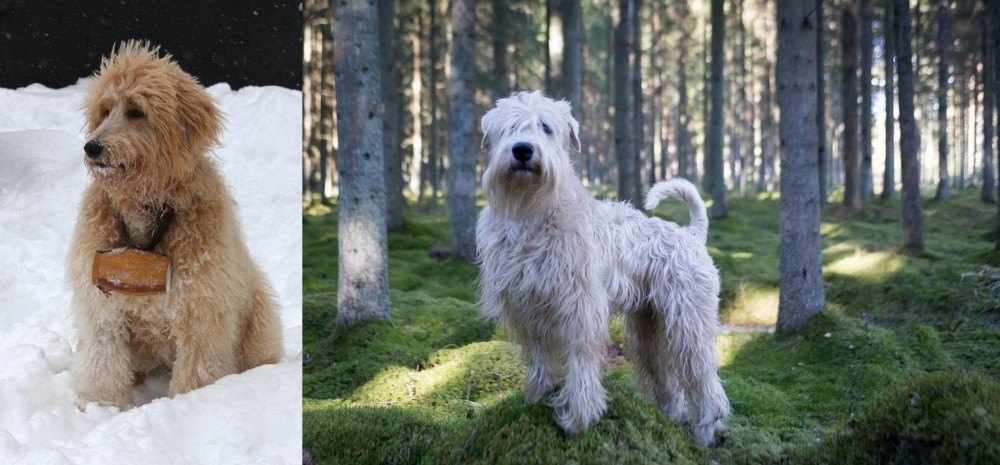 Petzlover
Petzlover Pyredoodle is originated from United States but Soft-Coated Wheaten Terrier is originated from United Kingdom. Pyredoodle may grow 36 cm / 15 inches higher than Soft-Coated Wheaten Terrier. Pyredoodle may weigh 26 kg / 58 pounds more than Soft-Coated Wheaten Terrier. Pyredoodle may live 3 years less than Soft-Coated Wheaten Terrier. Pyredoodle may have less litter size than Soft-Coated Wheaten Terrier. Both Pyredoodle and Soft-Coated Wheaten Terrier requires Moderate Maintenance.
Pyredoodle is originated from United States but Soft-Coated Wheaten Terrier is originated from United Kingdom. Pyredoodle may grow 36 cm / 15 inches higher than Soft-Coated Wheaten Terrier. Pyredoodle may weigh 26 kg / 58 pounds more than Soft-Coated Wheaten Terrier. Pyredoodle may live 3 years less than Soft-Coated Wheaten Terrier. Pyredoodle may have less litter size than Soft-Coated Wheaten Terrier. Both Pyredoodle and Soft-Coated Wheaten Terrier requires Moderate Maintenance.
 These dogs only originated in the 1980s, and as a designer dog they are a cross between a Standard Poodle and the Great Pyrenees, both ancient dog breeds.
These dogs only originated in the 1980s, and as a designer dog they are a cross between a Standard Poodle and the Great Pyrenees, both ancient dog breeds.
The breeders were looking for a non-shedding variation of both these popular breeds. This dog isn’t part of the American Kennel Club’s (AKC) list of dogs.
 This wheaten colored terrier hails from Ireland. Although the Wheaten has been around for a long time, it was in 1937 that he was recognized as a breed in Ireland.
This wheaten colored terrier hails from Ireland. Although the Wheaten has been around for a long time, it was in 1937 that he was recognized as a breed in Ireland.
The British Kennel Club also recognized the Wheaten and the dog was also exported to the United States. Serious interest started being shown for the Terrier in the 1970s. It was in 1973 that they were recognised by the American Kennel Club.
 The Pyredoodle is a large dog standing at between 60 and 86cm in height and weighing about 38 to 46kg.
The Pyredoodle is a large dog standing at between 60 and 86cm in height and weighing about 38 to 46kg.
The coat varies quite a bit, depending on which breed the dog leans towards. Colors can be white, cream, apricot, silver or black. Essentially the coat is a thick double-coat of medium length hair which is fairly straight or wavy.
The dog is a low shedder, thought to have a hypoallergenic coat. Floppy ears mean you will need to check inside the ears for redness and infection brought on by an excess wax build-up, dirt and moisture. If you allow your Pyredoodle to become a parent, the can produce between 2 to 4 puppies.
Coming from dogs with good temperaments, the Pyredoodle comes as being good natured. He plays well with children and gets on well with other animals in the house.
He is protective and takes his role as watchdog seriously. You can be sure he is going to be a loyal family dog. His high intelligence means he can be trained and socialized with ease and then he becomes obedient and well mannered.
He is good with children, and even though he is looked upon as being sweet natured, he still makes a great watchdog and protector of his human family.
 The Wheaten is a medium sized dog standing at between 43 and 50cm and weighing between 13 and 20kg both male and female. The coat of the dog is soft, silky and wavy to even curly and is a wheaten to ginger color.
The Wheaten is a medium sized dog standing at between 43 and 50cm and weighing between 13 and 20kg both male and female. The coat of the dog is soft, silky and wavy to even curly and is a wheaten to ginger color.
The coat of the puppy is dark but as he grows up it changes into the wheaten color although the ears may be a dark brown color. Pet owners like that the Wheaten is a very low shedding dog.
Playful, social and friendly, the Wheaten has always been put to good use on the farm. These days he is pet and companion. He is energetic and playful so children love having him around.
He is slightly more hyper and energetic than other Terrier breeds so will require a good dose of exercise.
He is smart and strong willed, and training and socialization turns him into an amicable pet to have around, so much so that he is sought after as a therapy-dog.
They’re easy-going dogs with no aggression issues but they still make great watch dogs and want to do whatever it takes to look after- and protect their human family.
 Attractive to look at, independent in nature, the Pyredoodle also has watchdog characteristics, being a protector of his human family.
Attractive to look at, independent in nature, the Pyredoodle also has watchdog characteristics, being a protector of his human family.
Like any dog, and particularly big dogs, it is important to train the Pyredoodle otherwise he could be too active and unruly when he comes indoors.
The Pyredoodle will absolutely thrive in a loving home where the people enjoy an active lifestyle.
The Pyredoodle comes from too excellent dog breeds. Both breeds make excellent watch dogs, they’re intelligent dogs who can be easily be trained. You can expect your crossbreed dog to be a loving, loyal, devoted pet who will add a wonderful dimension to your household.
 The Soft Coated Wheaten Terrier has always made an excellent farm dog, but today he is more suited as pet and companion.
The Soft Coated Wheaten Terrier has always made an excellent farm dog, but today he is more suited as pet and companion.
He adapts easily to life in the city or the countryside. Wherever he is, he will need his exercise. He also longs to be an active part of his human family, and then he’s happy, lively, social and friendly and is a great playmate for children.
 Designer dogs are often bred with the idea to eliminate some of the typical, common health issues that plague most dogs. These are among others, bloat, cancer, hip dysplasia, skin issues, ear infections, obesity, dental disease and others.
Designer dogs are often bred with the idea to eliminate some of the typical, common health issues that plague most dogs. These are among others, bloat, cancer, hip dysplasia, skin issues, ear infections, obesity, dental disease and others.
It is highly unlikely that your lively Pyredoodle will succumb to any of the major dog illnesses, but you need to watch him and get him to the vet when you see him displaying unnatural symptoms.
It is beneficial for your pet's health to have it neutered or spayed if you aren't interested in the dog having puppies.
 When you bring a Wheaten Terrier into your home, you’re not likely to have too many vet fees as he tends to be a healthy dog breed, being able to reach 13, 14 or 15 years of age with good care.
When you bring a Wheaten Terrier into your home, you’re not likely to have too many vet fees as he tends to be a healthy dog breed, being able to reach 13, 14 or 15 years of age with good care.
Look out for a dog ailment known as Protein-losing enteropathy (PLE). This is a condition where the dog isn’t able to properly absorb protein in the digestive tract, so that it is passed in their stools.
It can be fatal, but if caught early, some dietary changes can keep it under control.
Also, look out for inflammatory bowel disease. This disease occurs when the stomach of the dog has a large number of inflammatory cells which can change the lining of the digestive tract, preventing the normal absorption of food.
 The Pyredoodle is a large dog who will need regular exercise. Apart from walks every day, he’ll need ball- and rope games, throwing the frisbee, hide and seek games as well as games and toys that keep him mentally active as well.
The Pyredoodle is a large dog who will need regular exercise. Apart from walks every day, he’ll need ball- and rope games, throwing the frisbee, hide and seek games as well as games and toys that keep him mentally active as well.
With the Pyredoodle, never try to skimp on his food and buy the cheapest there is. He’ll get sick often because of the unwholesome ingredients such as colorants, preservatives, fillers and very few vitamins and minerals.
If you choose one of the commercially manufactured dog foods, make sure it is the high quality ones. Give him a treat now and again by providing him with tasty home-cooked food. It doesn’t have to be every day, just once or twice a week.
An excellent choice of food is boiled chicken, brown rice or pasta, sweet potatoes, carrots and spinach, all chopped up and added to the dry kibble. When you can, try and include a little bit of raw meat too. Make sure he has constant access to fresh, cool water.
The Pyredoodle can have a coat which can be either short and thick or it can be longer, wavy or quite curly. Grooming will be aimed at removing any loose hairs the dog has by brushing twice a week. The dog is a low shedder.
His floppy ears may mean you needing to check the insides to ensure they are free from infection. Other grooming for this dog includes trimming the nails, checking his eyes and looking inside his mouth for rotting teeth. A bad tooth can be terribly painful for your pet but it can also cause problems with other body parts such as the heart and kidneys.
Get your pet immediately to the vet if you suspect anything that can be detrimental to your dog’s health.
 Brush your pet’s silky coat twice a week. Such a silky coat can get all tangled and matted. If you prefer, many people opt to rather have the Wheaten’s coat professionally clipped as then it is easier to handle. They like to have the hair clipped that hangs over the dog’s eyes.
Brush your pet’s silky coat twice a week. Such a silky coat can get all tangled and matted. If you prefer, many people opt to rather have the Wheaten’s coat professionally clipped as then it is easier to handle. They like to have the hair clipped that hangs over the dog’s eyes.
Other grooming tasks require you to check inside his ears for redness which could indicate an infection. Trim his nails and check him over for ticks and fleas.
Have your Wheatie trained and socialized as he is a stubborn dog breed and you want him to be well mannered and obedient.
Terriers like this are energetic dogs and he is going to need exercise every day. A walk for a dog is always a welcome experience as it gives him the opportunity to sniff around and pick up new smells. Play ball- or frisbee games with him as this can tire him out a bit.
If your dog shows signs of illness, get him to the vet. He is such a feisty dog that it can be unbearable to see him out of sorts.
Terriers are energetic dogs so if you feed your dog one of the commercial dog foods, make sure the label indicates what food it is. This is because the foods are manufactured according to the type of dog it is, its age, size and energy levels.
Always try and go for the high quality foods which don’t have all those unhealthy ingredients in them. Try to include some home-made food – nothing exotic and spicy – just plain, wholesome food that won’t upset his stomach.
Boiled chicken, brown rice or pasta and spinach, sweet potatoes and carrots is super tasty and nutritious. You can chop it up and add it to your pet’s kibble twice a week.
Try and include a little bit of raw meat to his diet occasionally as this can go towards ensuring he doesn’t get skin diseases. Always ensure he has a constant supply of fresh, cool water available.